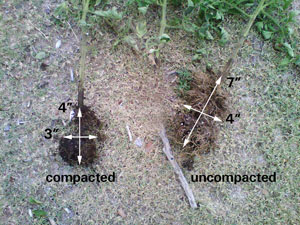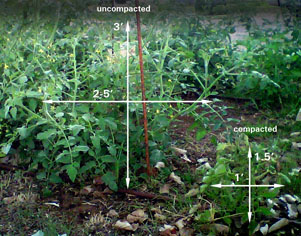5585 Guilford Road • Madison, WI 53711-5801 • 608-273-8080 • Fax 608-273-2021
www.agronomy.org
Twitter | Facebook
NEWS RELEASE
Contact: Hanna Jeske, Associate Director of Marketing and Brand Strategy, 608-268-3972, hjeske@sciencesocieties.org
Digging a proper hole in the soil
March 25, 2016 – You’ve gone to the garden center and bought your spring plants. All you need to do is dig a hole and water, right? Not quite so, says the Soil Science Society of America (SSSA) March 24 Soils Matter blog post. The post explains the benefits to your plants’ health of taking a bit more time to create the best hole.
According to soil scientist Clay Robinson, there are several factors to consider. Most important is the amount of compaction in your soil. If you dig a hole with a garden spade, and have smooth, compacted sides, all you’ve really done is create a bigger “pot” for your plant.
“Perhaps the most important concept for the long term survival of your plant is create a hole in and with un-compacted soil,” says Robinson. “Plants need water and air to survive. Compacted soils – from heavy equipment, too much foot traffic or many other sources – don’t have large enough soil pores in them. And roots have a very hard time pushing through compacted soils.”
 Robinson suggests taking a trowel or garden spade to loosen the soil all around the sides of the hole. “The soil will break off in small clumps of various sizes. If you look closely at the sides of the hole now, you can see some natural structure and cracks along the sides of the hole. These cracks help air and water movement, and root growth.”
Robinson suggests taking a trowel or garden spade to loosen the soil all around the sides of the hole. “The soil will break off in small clumps of various sizes. If you look closely at the sides of the hole now, you can see some natural structure and cracks along the sides of the hole. These cracks help air and water movement, and root growth.”
For more tips on digging the proper hole for your plant, read the entire blog post. Visit http://soilsmatter.wordpress.com.
American Society of Agronomy (ASA) and the Soil Science Society of America (SSSA) have developed two videos. One is shorter, and can be found at https://youtu.be/EHq2CP6Gso4. It quickly describes steps 1 and 4. Another video goes into more depth about many variations regarding the soil that will help your plant investments best succeed. It can be found at http://soils.peachnewmedia.com/store/seminar/seminar.php?seminar=60123. All serious gardeners and landscapers should watch these videos, and help our soil work in the best way possible to support plant growth – and protect those garden center investments!
Follow SSSA on Facebook at https://www.facebook.com/SSSA.soils, Twitter at SSSA_Soils. SSSA has soils information on www.soils.org/discover-soils, for teachers at www.soils4teachers.org, and for students through 12th grade, www.soils4kids.org.